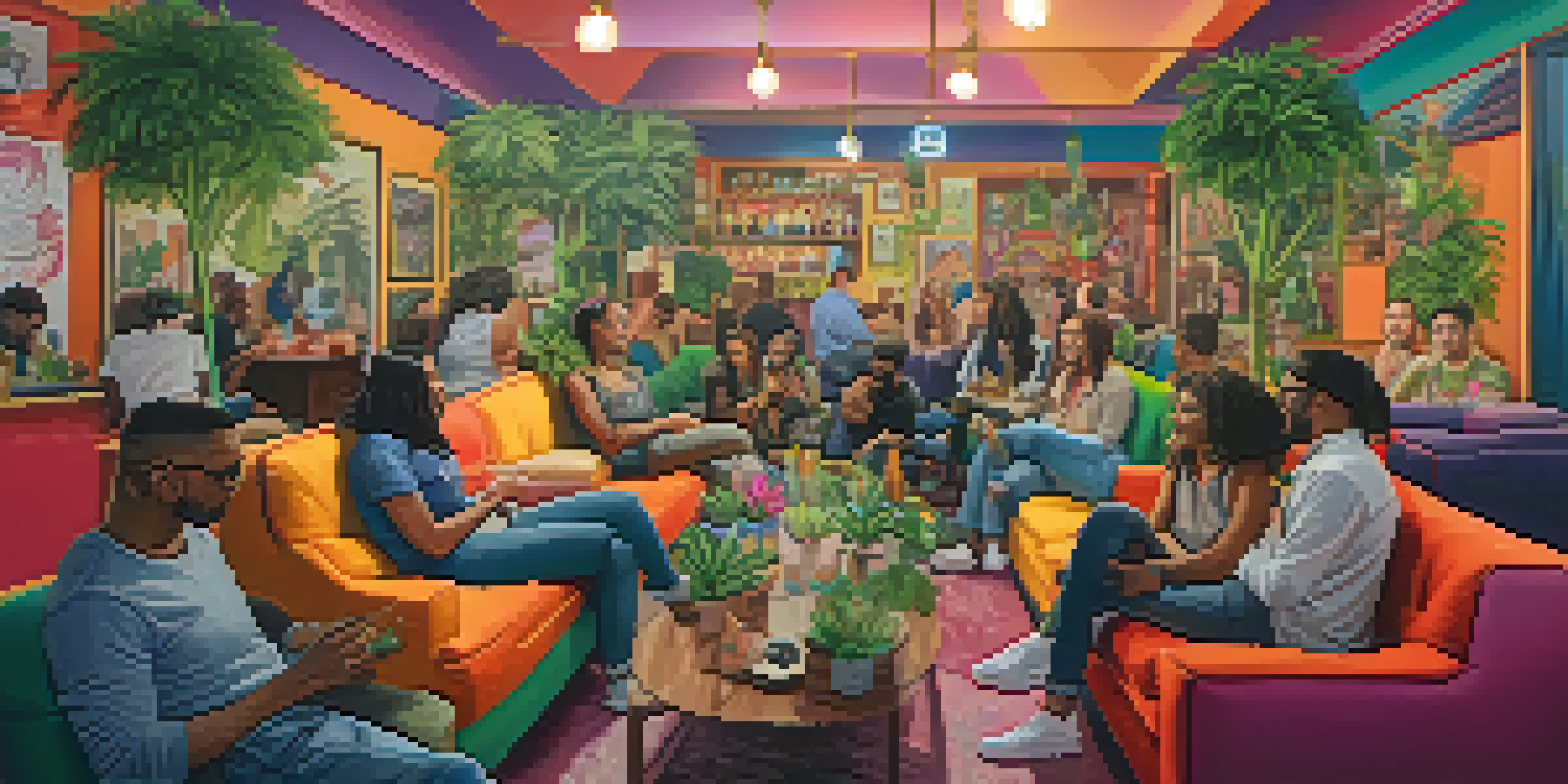Exploring Gender Identity Through the Lens of Marijuana Use

Understanding Gender Identity: A Brief Overview
Gender identity refers to an individual's personal sense of their gender, which may or may not align with the sex assigned at birth. It's a spectrum that includes identities such as male, female, non-binary, and genderqueer. Understanding this concept is crucial as it shapes how people experience the world and interact with others.
The most important thing is to enjoy your life—to be happy—it's all that matters.
In recent years, society has made significant strides in recognizing and respecting diverse gender identities. This growing awareness allows for more inclusive conversations about how various factors, such as culture and personal experiences, influence one's understanding of gender. As we delve into this topic, consider how these aspects intertwine with other elements of identity, like substance use.
Marijuana, often viewed as a recreational or medicinal substance, also plays a role in many people's exploration of their gender identity. For some, it can serve as a tool for relaxation and self-discovery, helping individuals feel more comfortable in their own skin.
The Historical Context of Marijuana and Gender
Historically, marijuana has been associated with counterculture movements, which often challenge societal norms, including those surrounding gender. As various groups pushed for social change, the use of marijuana became a symbol of rebellion and self-expression. This backdrop has made the plant a significant touchpoint for many exploring their gender identity.

As we reflect on the past, it’s essential to acknowledge how marginalized communities, particularly those within the LGBTQ+ spectrum, have used marijuana to cope with societal pressures. For many, it has provided a sense of community and belonging, allowing people to connect over shared experiences and struggles related to their gender identities.
Gender Identity is a Spectrum
Gender identity encompasses a range of identities beyond male and female, influencing how individuals engage with the world.
Additionally, the evolving legal landscape surrounding marijuana has also impacted how people engage with it. As more states legalize its use, individuals feel freer to explore its effects, including how it relates to their own gender journeys.
Marijuana's Role in Self-Exploration and Acceptance
For many individuals, marijuana can facilitate introspection, helping them navigate complex feelings about their gender identity. The psychoactive properties can promote relaxation and enhance self-awareness, making it easier to confront and embrace one's true self. This aspect of marijuana use can be particularly important for those struggling with societal expectations.
Your gender identity is your truth, and it deserves to be celebrated.
Moreover, the plant has been found to assist in reducing anxiety and depression, issues that often disproportionately affect the LGBTQ+ community. By alleviating these feelings, marijuana can create a space for individuals to express and explore their gender identity without as much fear or judgment.
However, it’s important to recognize that marijuana affects everyone differently. While some may find clarity and acceptance through its use, others might experience anxiety or confusion, particularly if they are still grappling with their identity.
Social Spaces: Community and Connection
For many, marijuana serves as a bridge to forming connections within the LGBTQ+ community. Cannabis lounges, events, and social gatherings often provide safe spaces for individuals to share their experiences and celebrate their identities. These environments can foster a sense of belonging that is vital for personal growth.
In these communal settings, discussions about gender identity can be more open and honest, allowing individuals to learn from one another. Sharing stories of struggle and triumph can create a powerful sense of solidarity, reinforcing the idea that no one is alone in their journey.
Marijuana Aids Self-Exploration
For many, marijuana can facilitate introspection and reduce anxiety, helping individuals navigate their gender identity.
As these communities continue to grow, they also contribute to the normalization of discussions around gender and marijuana use, helping to dismantle stereotypes and misconceptions. This evolution plays a critical role in cultivating a more inclusive society.
The Intersection of Gender Identity and Marijuana Culture
The culture surrounding marijuana often celebrates individuality and self-expression, aligning closely with the values of many gender-diverse individuals. This shared ethos allows for a unique intersection where people can come together to advocate for both identity and substance use rights.
As more gender-nonconforming individuals participate in the cannabis industry, they bring their perspectives and experiences, enriching the cultural narrative. This representation is essential as it helps to challenge the traditional norms often associated with both gender and marijuana.
Moreover, as various brands and businesses seek to appeal to a diverse audience, they are increasingly removing gendered marketing tactics. This shift opens up new avenues for individuals to engage with cannabis on their own terms, free from societal constraints.
Challenges and Stigma: Navigating Identity and Use
Despite the growing acceptance of both marijuana and diverse gender identities, challenges still exist. Stigma around marijuana use can be compounded with societal prejudices against non-binary or gender-nonconforming individuals, creating a unique set of challenges. This intersection can lead to feelings of isolation and fear of judgment.
Additionally, individuals may struggle with internalized stigma, feeling conflicted about their use of marijuana as they explore their gender identity. These feelings can hinder personal growth and acceptance, making it crucial to address and dismantle these negative perceptions.
Community Connections through Cannabis
Cannabis social spaces foster belonging and open discussions about gender identity, promoting solidarity within the LGBTQ+ community.
Creating supportive environments where people feel free to discuss their experiences with both gender and marijuana is essential. By fostering acceptance, we can help individuals navigate these complexities more comfortably.
The Future of Gender Identity and Marijuana Exploration
As society continues to evolve, so too will the conversations surrounding gender identity and marijuana use. With increased visibility and advocacy, there’s hope that more individuals will feel comfortable exploring their identities without fear of judgment. This progress can lead to a richer understanding of the diverse experiences within the LGBTQ+ community.
Moreover, as research on marijuana's effects continues to expand, we can expect more informed discussions about its role in gender identity exploration. Understanding the nuances of how marijuana interacts with mental health and identity will further empower individuals to make informed decisions about their use.

Ultimately, fostering open dialogues about gender and marijuana will benefit not just individuals but society as a whole. By embracing these conversations, we can cultivate a culture of acceptance, understanding, and support.